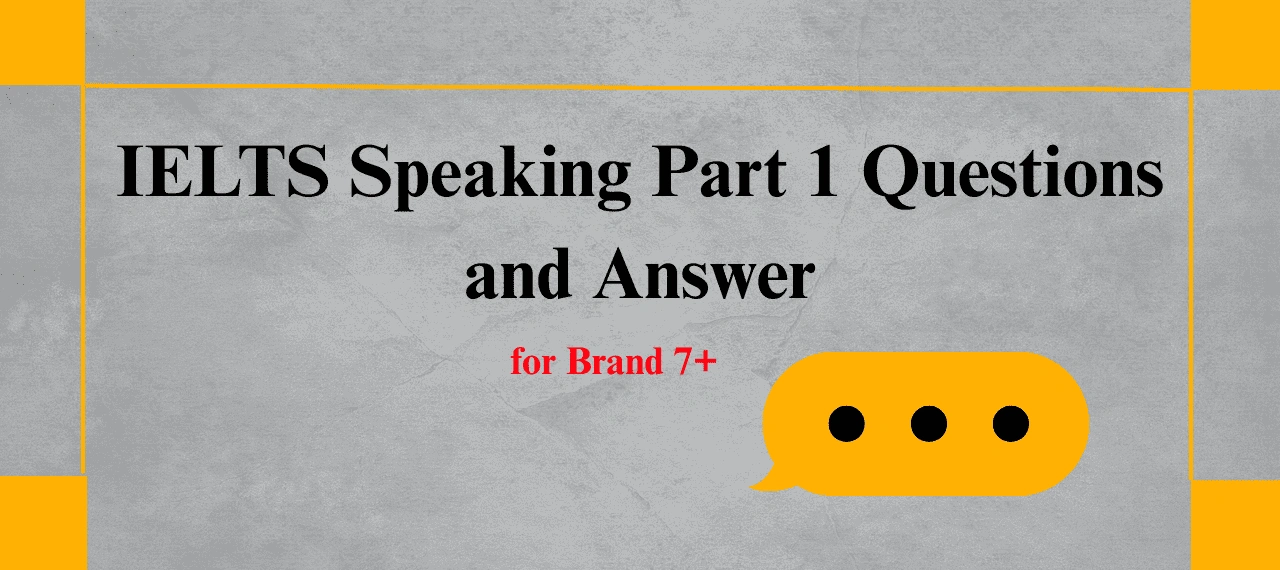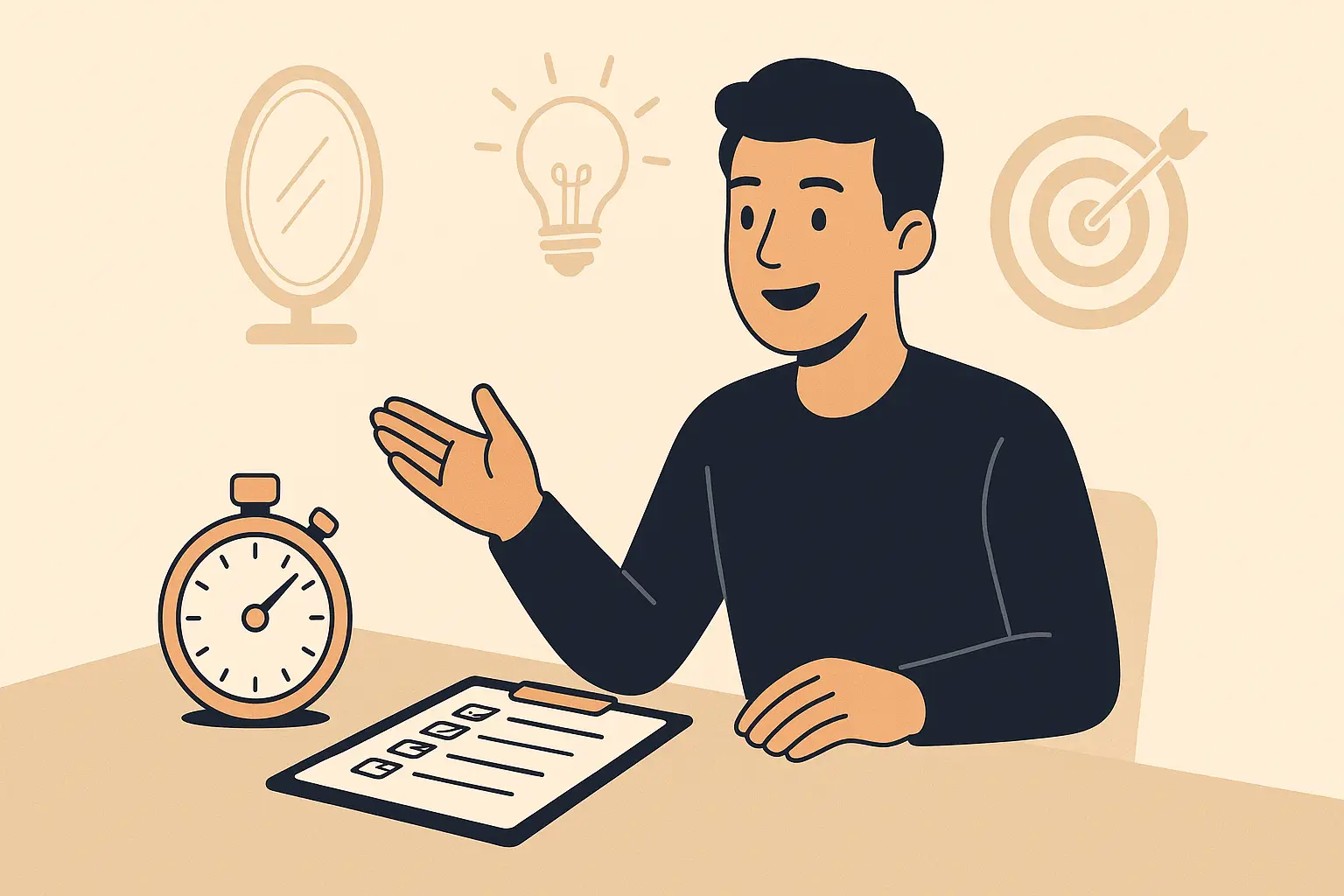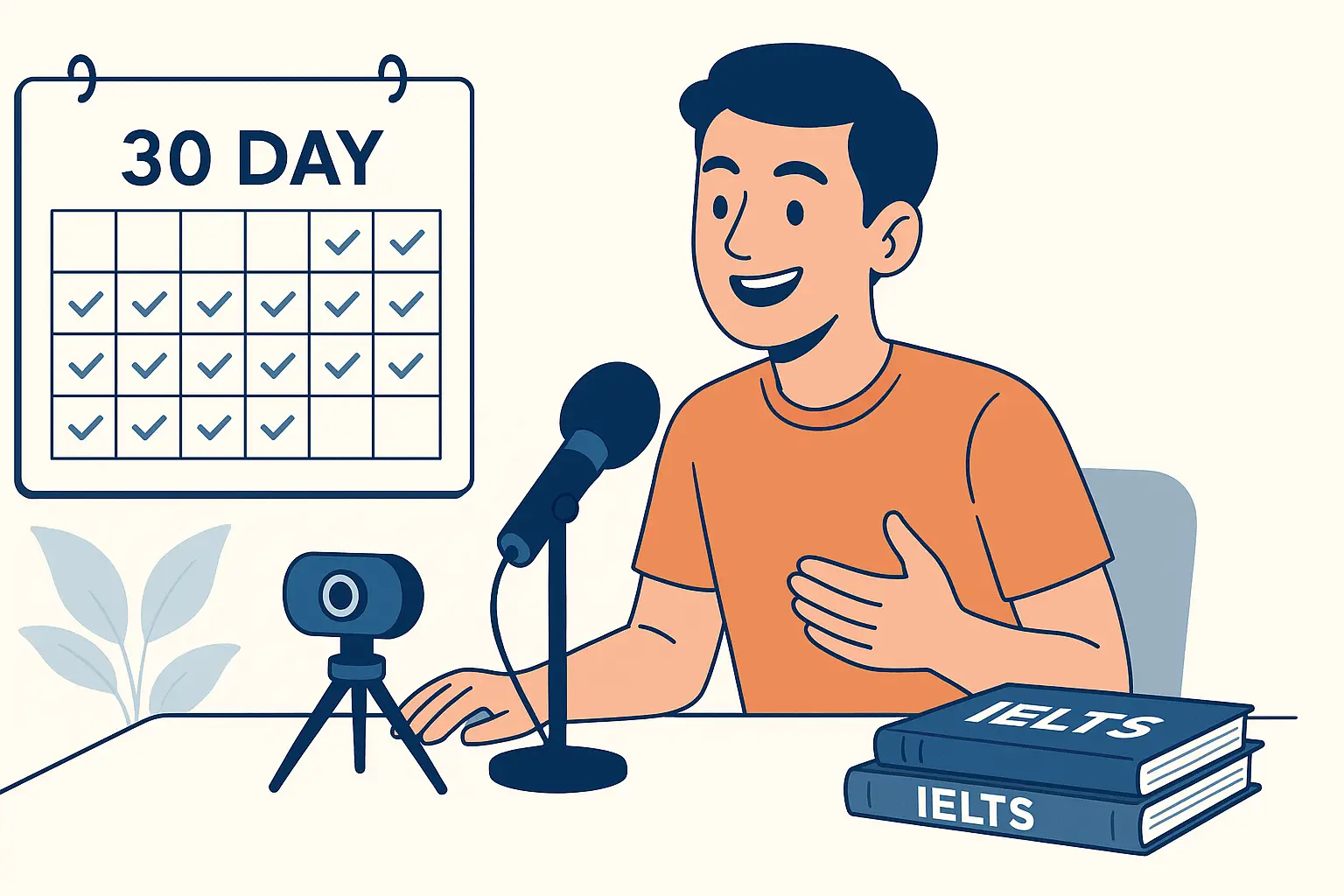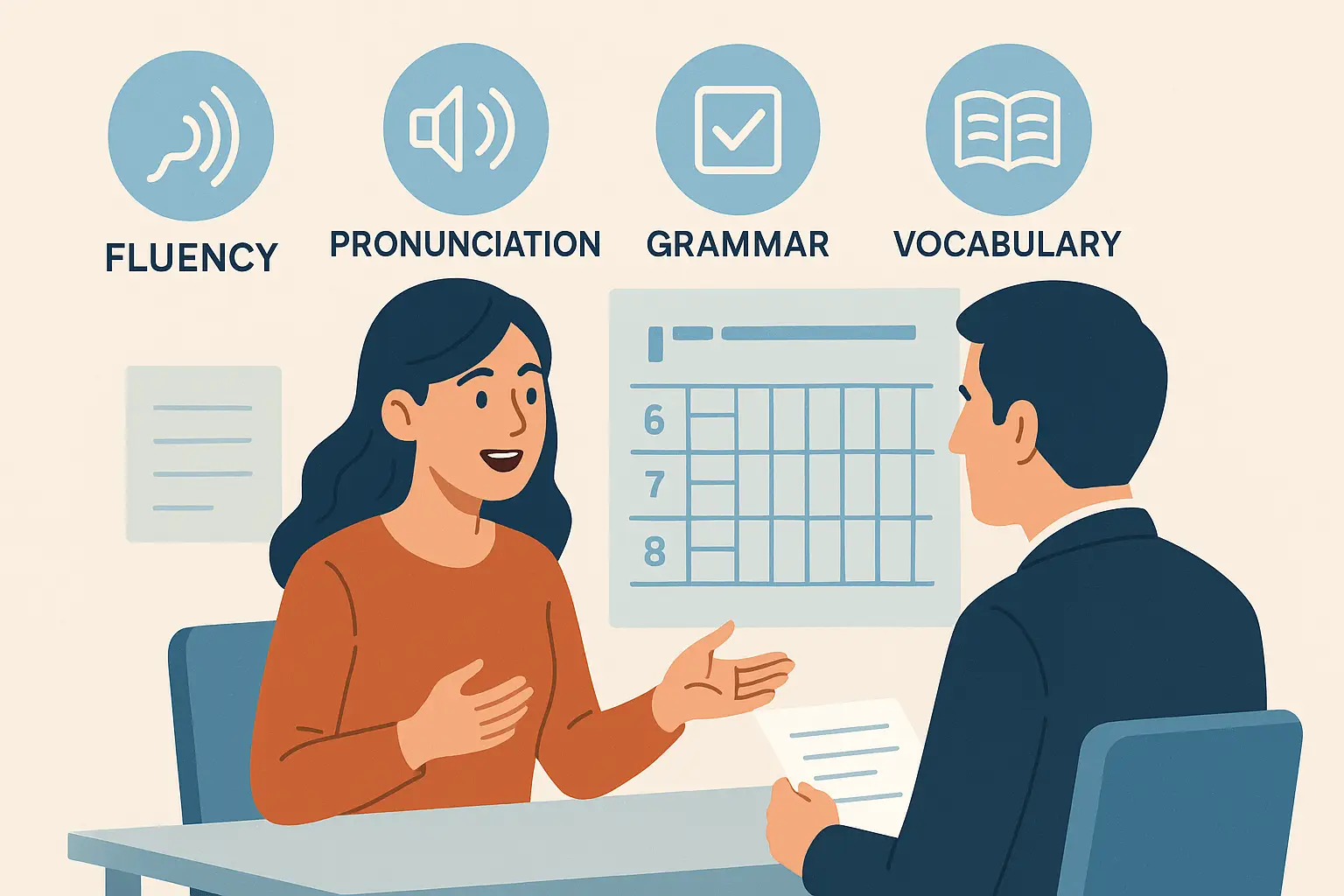“My examiner was nodding, but I still got Band 6.5. Why?”
That was a message from one of my students, Maya, just a few hours after her IELTS Speaking test. She felt confident in Part 1. Her answers were fluent. She smiled. She even got a few nods from the examiner. And yet, her score wasn’t what she expected.
I hear this story a lot. In fact, after helping over 2,000 IELTS candidates across 17 countries over the past 10 years, I’ve noticed a pattern. Most students underestimate Part 1 of the Speaking test. They see it as “the easy warm-up.” But in reality, it’s a scoring zone — one where Band 7 and 6.5 often get decided.
In this post, I’ll walk you through:
- Real IELTS Speaking Part 1 questions from my own students (recent tests)
- Band 7+ sample answers
- Common mistakes and how to avoid them
- What the examiner is really listening for
- A mini practice task at the end to apply what you learn
Whether your exam is in 2 days or 2 months, this guide will help you turn Part 1 into a confident, high-scoring start.
👉 Also read: IELTS Speaking Topics 2025 with Model Answers
What Is IELTS Speaking Part 1?
When I first introduce IELTS Speaking Part 1 to my students, I often get a casual shrug. “Isn’t that the easy part?” they ask. And yes, at first glance, it might seem that way. The questions are simple. The topics are familiar. But here’s what I tell every student — Part 1 is where the examiner forms their first real impression of your English. And those first few minutes matter more than you think.
IELTS Speaking Part 1 is the opening section of the test. It usually lasts 4 to 5 minutes and is designed to assess how comfortably and naturally you can talk about everyday topics. It starts with a quick greeting and ID check, and then the examiner will move on to 2–3 topics, each with 3–4 questions. That means you’ll typically answer around 9 to 12 questions in total.
The topics aren’t tricky. They include things like:
- Your hometown or neighbourhood
- Whether you work or study
- Your free time activities
- Food, travel, weather, technology, and so on
👉 For a complete breakdown of all parts of the speaking test, check out: IELTS Speaking Format and Scoring Explained
The key point is: just because the questions are easy doesn’t mean the answers can be basic. This part of the test gives you a chance to show how fluently and naturally you can speak. A response like “I like reading” is technically correct. But it won’t get you to Band 7.
In fact, I often say to my students: think of Part 1 like a conversation with a curious stranger who wants to know more about you. You want to be warm, clear, and open — but still smart with how you use language.
The examiner assesses you on:
- Fluency and Coherence (Is your speech smooth and logical?)
- Lexical Resource (Are you using a wide range of vocabulary?)
- Grammatical Range and Accuracy
- Pronunciation (Clarity, rhythm, intonation)
Even though the questions seem simple, the scoring is not. Saying “I like reading” might answer the question, but it won’t impress.
Real IELTS Speaking Part 1 Questions and Band 7+ Answers
Every year, I gather real Part 1 questions from my students who’ve recently taken the IELTS test — from Dhaka to Dubai, Delhi to London. The questions below are from actual tests taken in 2024, and I’ve rewritten the answers to reflect what a Band 7+ response sounds like.
You’ll also see examples of Band 6 answers, so you can clearly compare what makes one better than the other.
🏙️ Hometown
Q: What kind of place is your hometown?
❌ Band 6 Answer: It’s a big city with many buildings and people. There is traffic and markets.
✅ Band 7+ Answer: My hometown is a lively coastal city with a mix of traditional markets and modern shopping centres. It’s known for its seafood and relaxed lifestyle, though traffic can get intense during the holidays.
🧠 Teacher Tip: Give 1–2 clear features, use one descriptive word, and share a personal or sensory detail.
🎓 Work or Study
Q: What do you do? Work or study?
❌ Band 6 Answer: I study computer science. It is a good subject.
✅ Band 7+ Answer: I’m currently studying computer science at a public university. I chose it because I’ve always been curious about how systems and algorithms shape our digital lives.
⚠️ Mistake to Avoid: Don’t just state your job or subject — talk about why it matters to you.
🎬 Free Time
Q: What do you usually do in your free time?
❌ Band 6 Answer: I watch movies or hang out with my friends.
✅ Band 7+ Answer: In my spare time, I love watching psychological thrillers and reviewing them on my blog. It helps me unwind while also sharpening my critical thinking.
💡 Bonus Insight: Simple hobbies can become great answers if you show your passion or habits behind them.
☁️ Weather
Q: What kind of weather do you like?
❌ Band 6 Answer: I like cold weather. It is nice and not hot.
✅ Band 7+ Answer: I really enjoy cool, breezy weather, especially when it’s cloudy but not rainy. It makes long walks more pleasant and helps me feel calm and focused.
📝 Mini Guide:
- Add sensory or emotional words (e.g., breezy, sticky, uplifting)
- Explain why you enjoy it with a brief example
🍜 Food
Q: What kind of food do you like to eat?
❌ Band 6 Answer: I like fast food. It is tasty and cheap.
✅ Band 7+ Answer: I’m a big fan of Asian street food, particularly Thai and Vietnamese dishes. I enjoy how the flavours balance sweet, spicy, and sour all in one bite.
📌 Note: Be specific. Naming types of cuisine and describing flavour helps demonstrate vocabulary range.
📱 Mobile Phones
Q: Do you often use your phone?
❌ Band 6 Answer: Yes, I use my phone every day for chatting.
✅ Band 7+ Answer: Absolutely. I use my phone daily, mainly for messaging, scheduling, and listening to podcasts during my commute. It’s become almost like a second brain!
😄 Try This: Add humour, unique habits, or figurative language to keep your answer natural and engaging.
👕 Clothes
Q: What kind of clothes do you usually wear?
❌ Band 6 Answer: I wear casual clothes. T-shirts and jeans.
✅ Band 7+ Answer: I mostly wear casual, comfortable clothes like cotton shirts and slim-fit jeans, especially when I’m on campus. But I do enjoy dressing up for special occasions.
⚠️ Common Mistake: Just listing clothing items sounds basic. Show preferences, routines, or context (e.g., where or why you wear something).
Work or Study
Q: What do you do? Work or study?
Band 6 Answer: I study computer science. It is a good subject.
Band 7+ Answer: I’m currently studying computer science at a public university. I chose it because I’ve always been curious about how systems and algorithms shape our digital lives.
Mistake to Avoid: Don’t just say your major — explain your interest.
Free Time
Q: What do you usually do in your free time?
Band 6 Answer: I watch movies or hang out with my friends.
Band 7+ Answer: In my spare time, I love watching psychological thrillers and reviewing them on my blog. It helps me unwind while also sharpening my critical thinking.
Bonus Insight: Turn a simple habit into something that reveals your personality.
Weather
Q: What kind of weather do you like?
Band 6 Answer: I like cold weather. It is nice and not hot.
Band 7+ Answer: I really enjoy cool, breezy weather, especially when it’s cloudy but not rainy. It makes long walks more pleasant and helps me feel calm and focused.
Mini Guide:
- Add sensory words (breezy, warm, sticky)
- Say why you like it
Food
Q: What kind of food do you like to eat?
Band 6 Answer: I like fast food. It is tasty and cheap.
Band 7+ Answer: I’m a big fan of Asian street food, particularly Thai and Vietnamese dishes. I enjoy how the flavours balance sweet, spicy, and sour all in one bite.
Note: Use specific foods, cultural references, and descriptive language.
Mobile Phones
Q: Do you often use your phone?
Band 6 Answer: Yes, I use my phone every day for chatting.
Band 7+ Answer: Absolutely. I use my phone daily, mainly for messaging, scheduling, and listening to podcasts during my commute. It’s become almost like a second brain!
Try This: Add humour, imagery, or a personal habit.
Clothes
Q: What kind of clothes do you usually wear?
Band 6 Answer: I wear casual clothes. T-shirts and jeans.
Band 7+ Answer: I mostly wear casual, comfortable clothes like cotton shirts and slim-fit jeans, especially when I’m on campus. But I do enjoy dressing up for special occasions.
Common Mistake: Saying the name of clothes without adding personality.
Common Student Mistakes in IELTS Speaking Part 1
Over the years, I’ve sat through hundreds of mock speaking sessions. And if there’s one thing I’ve learned, it’s this: most mistakes in Part 1 are preventable. Below are the most common issues I notice — plus how you can fix them before exam day.
👉 Want to catch your own mistakes before the examiner does? Try this: IELTS Speaking Self-Assessment Checklist
❌ 1. Giving Short, Dry Answers
The problem: Many students treat Part 1 like a yes/no quiz. Answers like “Yes, I do” or “No, not really” might seem safe — but they don’t show the examiner your speaking ability.
How to fix it: Extend every answer with at least 1–2 more sentences. Share a reason, an example, or even a small story. Think of it as answering a friend’s follow-up question.
🎙️ Q: Do you like music?
Weak: Yes, I do.
Stronger: Yes, I love listening to indie folk music — especially when I’m working or relaxing at home. It helps me stay focused and calm.
❌ 2. Overthinking Vocabulary
The problem: Some learners believe using fancy words like “ameliorate” or “phenomenon” will boost their score. But forced vocabulary often sounds unnatural.
How to fix it: Use natural, everyday words correctly. It’s better to say “I’m exhausted” naturally than “I am in a state of extreme fatigue” awkwardly. Clarity and tone matter more than complexity.
❌ 3. Forgetting to Show Grammar Range
The problem: Many students rely only on present simple tense: “I go to school.” “I like tea.”
How to fix it: Mix it up! Use the past, future, conditionals, or comparisons when relevant.
🌟 Example: “I used to read a lot as a child, but now I mostly listen to audiobooks while commuting.”
👉 Need help with grammar variety? Check this out: IELTS Speaking Grammar Essentials
❌ 4. Sounding Memorized
The problem: Rehearsed answers often sound robotic. Examiners are trained to spot this and won’t reward it.
How to fix it: Practice ideas, not scripts. Talk to friends, record yourself, and experiment with how you express the same thought in different ways. Natural rhythm beats textbook lines.
🚫 “In today’s modern era, technology plays a pivotal role in everyone’s life.”
✅ “To be honest, I use my phone way too much — especially for social media and shopping!”
Real Examiner Traps (and How to Beat Them)
Let’s talk about what your IELTS Speaking examiner is actually trained to notice — and how to make sure you’re not giving away easy marks.
After speaking with examiners and reviewing hundreds of student performances, I can tell you that some traps are easier to fall into than you’d think. Even confident students get caught here:
👀 What Examiners Instantly Notice:
- Memorised or robotic answers that sound rehearsed
- Lack of cohesion, like jumping from idea to idea without flow
- Limited grammar use, especially relying only on present tense
- Flat pronunciation, where there’s no rise or fall in your voice (intonation)
These signals make your speech sound unnatural — and the examiner will mark you down, often without you realising why.
✅ How to Beat These Traps
🔗 Use linking expressions naturally: Words like actually, to be honest, for example, one thing I’ve noticed is… create flow and show coherence.
🧠 Vary your grammar: Throw in a past perfect, a conditional, or a future plan.
“I would have joined the club earlier if I’d known about it.” “Next year, I’m planning to apply for an exchange program.”
🎧 Work on your intonation: Sound interested in what you’re saying. Avoid a monotone. Try to speak as if you’re telling a short story, not reading a script.
👉 Learn what examiners look for: IELTS Speaking Band Descriptors
Practice Task: Record Yourself!
If you’re serious about improving, this is the part where you pause reading — and actually speak.
Here are three realistic IELTS Speaking Part 1 questions that cover different themes. Grab your phone, hit record, and answer each one as if you’re sitting in front of an examiner.
🎯 Your Goal: Speak for 60–90 seconds per question. Don’t worry about being perfect — focus on fluency, natural expression, and range.
🎤 Questions to Practice:
- Do you prefer mornings or evenings?
- What do you usually do on weekends?
- Did you enjoy reading as a child?
✅ Post-Practice Self-Review Checklist:
- Did I answer the question directly?
- Did I expand with a reason, detail, or example?
- Did I use at least one descriptive or topic-specific word?
- Did my answer sound natural, not robotic or memorised?
- Did I vary my grammar or tense at least once?
🎧 Pro Tip: Listen to your recording twice — once for content and once for delivery. Note anything that sounds unclear, repetitive, or rushed.
👉 Want full test simulation with timed prompts and feedback? Try this: IELTS Speaking Mock Test Practice
Final Thoughts: The Power of Part 1
Most students treat Part 1 like it’s just a warm-up. But in my years of teaching, I’ve seen this small section carry a big impact on final scores. It sets the tone — for you and for the examiner.
If you begin clearly, speak naturally, and show just a bit of range in vocabulary and grammar, you immediately build momentum. That rhythm can carry you confidently through Parts 2 and 3.
🎯 I’ve worked with learners who went from Band 6.0 to 7.0+ simply by upgrading how they answer everyday questions like “What do you do on weekends?” or “Do you prefer tea or coffee?”
So here’s what I want you to remember:
- Don’t memorise. Speak honestly.
- Don’t rush. Breathe and connect your thoughts.
- Don’t try to impress. Just try to express — with a little style.
IELTS Speaking is still a test, yes. But at its heart, it’s a conversation. One you can enjoy.
👉 Next: IELTS Speaking Part 2 Cue Card Strategy
👉 Then: IELTS Speaking Part 3 Opinion Techniques
👉 Also visit: IELTS Speaking Vocabulary for Band 7+
If this blog helped you, let me know in the comments — or better yet, share it with someone who’s also chasing that Band 7+ dream.
🙌 You’ve got this!






16 Responses
Amazing things here. I am very happy to see your article.
Thank you so much and I’m taking a look ahead to touch
you. Will you please drop me a mail?
Very interesting details you have noted, regards for putting up. “In a great romance, each person plays a part the other really likes.” by Elizabeth Ashley.
Inspiring quest there. What happened after? Good luck!
Wonderful blog! I found it while browsing on Yahoo News.
Do you have any tips on how to get listed in Yahoo News?
I’ve been trying for a while but I never seem to get there!
Many thanks